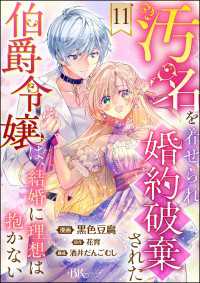- ホーム
- > 洋書
- > 英文書
- > History / World
Full Description
Using the life and work of influential Chinese writer Guo Moruo (1892-1978), reflects on China's encounters with modernity, Communism, and capitalism.
Why did China's intellectuals turn to Communism? Reflecting on China's encounters with modernity, Communism, and capitalism, Xiaoming Chen offers an explanation by using as a case study the life and work of influential Chinese writer Guo Moruo (1892-1978). Guo was dedicated to the May Fourth Movement, which sought to bring reform, republicanism, and modern Western ideas to China, but abandoned these ideals for Communism in the mid-1920s. While the hope of national salvation was a major factor in Guo's conversion, Chen suggests other reasons, including a desire to save the whole world, a goal that was consistent with the traditional Confucian call to not only "manage the state" but also "harmonize the world." Chen also argues that despite the collectivist and totalitarian outcome of the Chinese Communist movement, Marx's initial promise of ultimate individual emancipation served as a major attraction to intellectuals like Guo, who came to view Marxist Communism as the most efficient and thorough way to fulfill their dream of individual freedom.
The book covers Guo's intellectual and personal transitions, how the fight against the Confucian family system became the Marxist emancipation of the individual from capitalism, and how the Confucian struggle against sexual desire ceded to a struggle against material desires. The various combinations of Western and Confucian thought that Guo adopted ultimately led to a synthesis of Confucianism and Marxism-Leninism.
Contents
List of Illustrations
Acknowledgments
Introduction
1. Toward Individual Emancipation and Personal Moral/Spiritual Salvation
From the May Fourth Individualist Rebellion to the Marxist Cause of Individual Emancipation
A May Fourth Individualist Awakening
From the May Fourth Individualist Awakening to a Marxist Radical Approach to Individual Emancipation
Striving for Personal Moral/Spiritual Salvation: From a May Fourth Confucian Focus to a Communist Confucian Battle
A May Fourth Focus
Shifting the Focus
2. Toward National Salvation
May Fourth Love and Concern for the Motherland
The Mid-1920s: Dedication to Saving China through Communist Revolution
3. Toward the Liberation of Mankind
A May Fourth Cosmopolitanist Ideal of Datong: A Pastoral/Primitive Paradise
The Datong Ideal
The Cosmopolitan World and the Individual and the Cosmopolitan World and the Nation
The Cosmopolitanist Ideal and a "Mentality of Extremes"
The Means to Achieve the Ideal: Leftist Radicalism to Save the World?
The Mid-1920s: Finding a Modern "Scientific" Echo of Datong in Marxism and Committing to Revolution
Attracted to the Marxist Cosmopolitanist Ideal
Committing to Marxist/Leninist Revolution as the Means to Achieve the Cosmopolitanist Ideal
4. Toward a Solution to Modern China's Intellectual Crisis
A May Fourth Solution to the Intellectual Crisis
Defending the Best of Chinese Tradition
Combining the Best of China with Modern Western Science and Goetheanism
A May Fourth Synthesis of the Best of the East and West as a Solution to the Intellectual Crisis
The Mid-1920s: Solving China's Intellectual Crisis through the Combination of Confucianism and Marxism/Leninism
Redefining the Best of the East and West
The Formation of a Confucian/Marxist/Leninist Communist Synthesis
Conclusion
Notes
Bibliography
Index
-

- 電子書籍
- 汚名を着せられ婚約破棄された伯爵令嬢は…
-

- 電子書籍
- 不機嫌な英語たち
-

- 電子書籍
- 陽の当たる丘 第2章 万理子の章 分冊…
-

- 電子書籍
- 田舎のホームセンター男の自由な異世界生…
-

- 電子書籍
- 謀略のパンツァー【電子単行本】 1 少…



